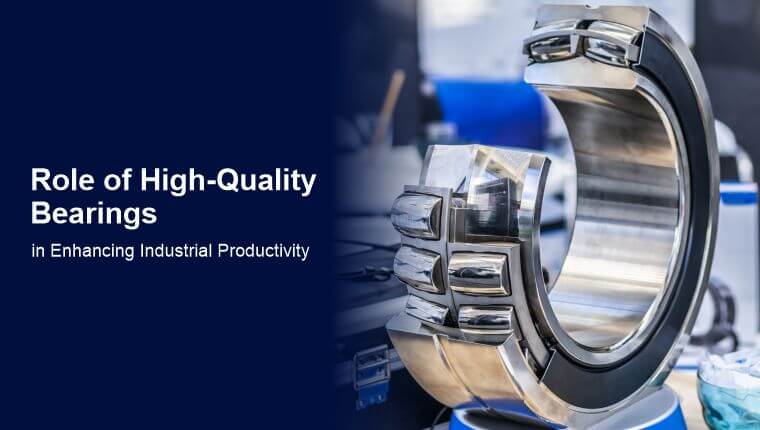High productivity is one of the most essential objectives in the modern world, and it is characterized by industry. In the same way, every small gear, from a conveyor line to huge industrial machinery, needs perfect parts to function optimally. Bearings are some of the most critical components that make this possible. At the most basic level, bearings minimize the contact stress between moving components so that equipment is subjected to less wear and tear. However, bearings of higher quality perform much more than just the friction-reducing factor. It can be used to improve industrial output speeds, as well as reduce the rates of machine deterioration.
This article will examine the impact of high-quality bearings on increasing industrial output. We will also investigate how they enhance system flow cost efficiencies and minimize downtimes.
Understanding Bearings
But what are bearings, and why its quality is so important? Bearings help support and decrease the load between two structures that are in touch with each other. They permit only rotational or linear motion with low friction. Bearings are used in every industrial device, including motors, pumps, large equipment, and conveyors.
How High-Quality Bearings Enhance Productivity?
High-quality bearings offer several advantages that all correlate directly with industrial output. Let’s see how these relatively small elements affect the whole picture.
1. Minimized Downtime
One of the biggest problems that industries face is certainly downtime. It can experience severe losses within several hours when the equipment is out of order. Hence, failure to operate with high-quality bearings compromises this aspect. These bearings are generally compatible with higher loads, highest speeds, and even high-temperature conditions. Therefore, they do not wear out easily, minimize wear and tear, and help avoid frequent breakdowns.
For instance, when the motor bearing of a factory deteriorates and can no longer hold up the motor, the whole line may be affected and will require fixing –time and money well spent. Premium grade bearings make them more durable and can operate continuously without causing any inconvenience to a given machinery. This, in turn, leads to the handling of fewer interruptions and delays.
2. Improved Operational Efficiency
The performance of machines is dependent on high-quality bearings. They lower the energy utilization complexities and utilize the machinery, smoother the process. Low-quality bearing raises the resistance of fabrics, so the friction needed to move its power is consumed. This consumes more energy than the continuous type; therefore, it incurs higher operation costs.
On the other hand, high-quality bearings result in minimal friction so that machines can operate with less energy. This can result in significant rationalization in the long-run periods when machines are always in operation.
3. Increased Equipment Longevity
Most mechanical equipment often requires bearings; high-quality bearings will increase the lifespan of the machinery. In other words, they assist in avoiding early failure and system breakdown since they decrease tension in the components. This is important because the costs of fixing or even replacing some of the machinery can be prohibitive. Most importantly, abstract bearings help avoid early wear in equipment; hence, equipment longevity and proper functioning are maintained.
In other words, the low cost of owning premium bearings goes a long way toward ensuring productive results. Thus, maintenance costs can be minimized, and equipment breakdown can be avoided, allowing industries to continue producing at all times.
4. Better Load Handling
Bearings are also subjected to a lot of stress because industries work with heavy loads. Still, the high-quality bearings can take loads significantly higher than those with standard quality bearings. This means they can operate at a higher difficulty level without jeopardizing their success.
For instance, machines are expected to operate under pressure and heavy workloads in factories or building and construction projects. The reliability of the high-quality bearings enables the accomplishment of the above tasks since such bearings facilitate the continuation of machine functions under extreme conditions without failure.
5. Enhanced Precision and Speed
Accuracy plays a significant role in today’s world, particularly in the production field, car, and aircraft industries. Good quality bearings give the vehicle less friction and finer movements, which will help maintain good tolerances and high speed.
For example, bearings are critical components of CNC machines used in precise manufacturing, especially for controlling speed, among other issues in the cutting process. Likewise, in the automotive field, bearings assist the engine to run at high speeds without much friction and vibration. These machines would lose speed, precision, and reliability without high-quality bearings.
The Bottom Line
In conclusion, bearings are a core critical component in improving industrial efficiency. They reduce operational time and duration of equipment breakdowns and maximize productivity, reliability, and durability. Furthermore, high-quality bearings bear a high load and operate more accurately and with less energy.
In other words, ensuring that the organization is endowed with appropriate bearings means enjoying enhanced operations, thereby improving the organization’s productivity. High-quality bearings are the most essential requirement for strengthening the machinery’s durability and the processes’ efficiency. By selecting the appropriate bearings, industries can maximize output, increase efficiency, save money, and operate at optimum levels, making them a critical component for any industrial setup.




